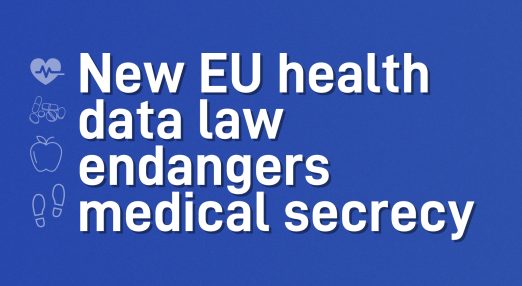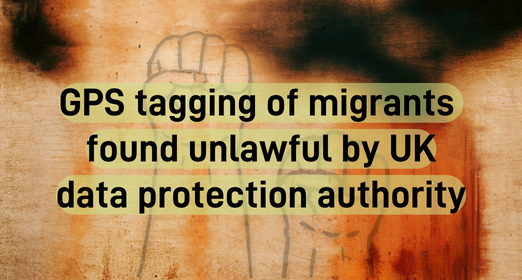Privacy
Filter by...
-

Open Letter: Civil society concerned about extensive and indiscriminate data retention regime in Switzerland
19 civil society organisations have penned a letter to the Swiss Federal Department of Justice and Police (FDJP) to express serious concerns about their plans to extend the Swiss Data Retention regime. They call on the Federal Councilor to align Swiss legislation with the highest standards of protection for people’s privacy.
Read more
-

How Danes je nov dan helped stop dangerous spyware in Slovenia
EDRi affiliate Danes je nov dan launched a multi-faceted campaign in response to a government proposal that would allow the Slovene Intelligence and Security Agency (SOVA) to use invasive spyware and mass surveillance tools under the guise of “national security”. By combining a satirical online tool with targeted advocacy towards lawmakers, their efforts helped generate critical pressure needed to stop the legislation from being adopted.
Read more
-

EU adopts Digital Trade Agreement with Singapore despite warnings: a setback for digital rights and democratic oversight
The European Parliament has approved the EU–Singapore Digital Trade Agreement, rejecting a motion to seek a Court of Justice opinion on its legality. This decision weakens the Union’s capacity to safeguard privacy, data protection, and accountability over software systems, at a time when deregulation pressures are increasing across Europe.
Read more
-

Judge grants Meta limited postponement in Bits of Freedom lawsuit
In early October, digital human rights organization Bits of Freedom took Meta to court. The organization demanded that Meta offers its users on in apps such as Instagram and Facebook the option to choose a feed that is not based on profiling. The judge ruled in favour of Bits of Freedom and ordered Meta to modify its apps within two weeks. Meta claimed that such changes were impossible to deliver in that timeframe and asked the Amsterdam Court of Appeal for a postponement. The court has now ruled that Meta will indeed be granted a postponement.
Read more
-

Ljubljana’s municipal surveillance: Where trust trumps data
During a Ljubljana municipal council debate on CCTV transparency, several concerning points were raised regarding the Slovenian capital's network of over 500 surveillance cameras and the methods employed to assess their effectiveness in preventing crime. The discussion revealed that the entire system relies heavily on trust in the authorities, without any substantial data to support the cameras' effectiveness or a clear rationale for their widespread deployment.
Read more
-

The ePrivacy Regulation proposal has been withdrawn, but the fight for your privacy is far from over
The European Commission's withdrawal of the ePrivacy Regulation proposal is a major setback for privacy rights in Europe, driven by pressure from industry interests and national security concerns. However, EDRi remains committed to advocating for stronger privacy protections, challenging commercial and state surveillance in future legislative efforts.
Read more
-

Firefox tracks you with “privacy preserving” feature
EDRi member noyb filed a complaint against Mozilla for quietly enabling a supposed “privacy feature” (called Privacy Preserving Attribution) in its Firefox browser. Contrary to its reassuring name, this technology allows Firefox to track user behaviour on websites
Read more
-

Rushed EU eID Wallet risks privacy and security: Calls for safeguards are getting ignored in hasty eIDAS implementation
From a visit to the doctor to public transport tickets , the European eID will handle our most sensitive personal data in a wide range of every-day applications. Yet, speed seems more important to the European Commission than a properly functioning eID system that is safe & secure to use.
Read more
-

The future of our fight against biometric mass surveillance
The final AI Act is disappointingly full of holes when it comes to bans on different forms of biometric mass surveillance (BMS). Despite this, there are some silver linings in the form of opportunities to oppose BMS in public spaces and to push for better protection of people’s sensitive biometric data.
Read more
-

Privacy is not for sale: Meta must stop charging for people’s right to privacy
Ahead of a crucial opinion by the European Data Protection Board (EDPB) – a grouping of the EU’s chief privacy regulators - on Meta’s plan to charge for privacy, the European Commission has opened an investigation that we hope will cast light on the unlawfulness of Meta’s so-called ‘Pay or Okay’ model, which has become the ‘talk of the town’ in Brussels.
Read more
-

New EU health data law endangers medical secrecy
EU lawmakers have agreed on a compromise for the European Health Data Space (EHDS) which will expose everyone’s medical records to unnecessary security and privacy risks in the name of research and “innovation”.
Read more
-

GPS tagging of migrants found unlawful by UK data protection authority
As a result of Privacy International’s 2022 complaint against the UK Home Office, the UK data protection authority (ICO) has found that the GPS tagging of migrants and asylum seekers arriving to the UK small boats was unlawful, and issued a formal warning for all future data protection compliance of GPS tagging as a whole. This is a major step towards better scrutiny of the human rights implications of the surveillance of migrants.
Read more
